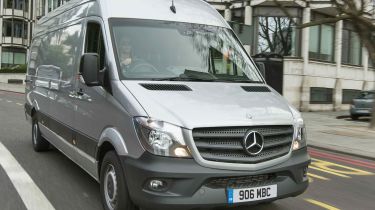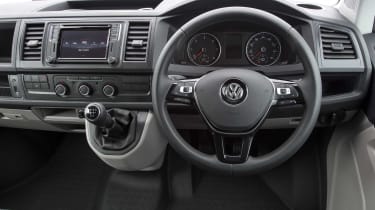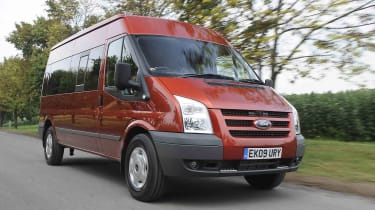Can I drive a van on a car licence?
Need to hire a van for moving house or clearing rubbish? We explain the rules and regulations

Driving a van can be very useful if you’re moving house or need to do a clearout, and the good news is that a standard car licence will allow you to legally drive a van in most cases. However, there are some important restrictions and rules to keep in mind.
While some vans can be driven with a standard driving licence, the largest ones require you to hold a special category of licence before you get behind the wheel. Read on to find out which vans you can and cannot drive on your licence.
Which vans can I drive on a standard car licence?
Drivers with a standard UK car driving licence are legally allowed to drive a wide variety of vans weighing up to 3,500kg Gross Vehicle Weight (GVW), the weight of the vehicle when fully loaded with passengers and cargo. This means that car licence holders can drive vans ranging from the smaller Ford Transit Connect and Volkswagen Caddy to mid-size models like the Renault Trafic and Volkswagen Transporter, and up to full-size vans such as the Mercedes Sprinter and Ford Transit.

The standard car driving licence in the UK is the Category B licence and anyone who got their licence after 1st January 1997 is permitted to drive both cars and vans carrying up to eight passengers and not exceeding 3,500kg when fully laden. These post-1997 Category B licence holders have to get a Category C1 licence to allow them to drive vehicles with a gross vehicle weight. Category B licence holders who got their licence before 1st January 1997 are allowed to drive cars and vans up to 7,500kg gross vehicle weight with no additional licences.
It’s important to bear in mind that what van you can drive depends on your licence and the gross vehicle weight of the van itself. Some of the larger panel vans are available in higher-capacity variants that exceed the 3,500kg maximum weight that a post-1997 Cat B licence entitles you to drive. You will be allowed to drive most vans in the Ford Transit and Mercedes Sprinter class but not all of them.
In the unlikely event that a hire company offers you a van that looks longer or taller than you expected, it's worth double-checking what the GVW is and if this van is right for you. Rental company staff will always offer advice and won't want to risk breaking the law by providing a van that you can't legally drive.
How old do I need to be?
By law a 17-year-old Cat B licence holder can drive a car or van not exceeding 3,500kg. However, van rental companies reserve the right to implement their own rules. Many companies will refuse a van rental to drivers under 21 years of age, and costs can be much higher for anyone under 25. These limitations are often determined by the rental company’s insurance policy – if you're 25 or over, though, it's likely that you'll be covered by the company's standard policy.
Is driving a van difficult?
The first consideration when driving a van for the first time is that it’ll be bigger and heavier than the car you normally drive. You also sit in a rather different position that gives a fresh perspective on the world around you.
Modern vans have power-steering, well positioned controls and responsive engines, so controlling one is no more difficult than a large family saloon. You may, however, find positioning the van on the road a little tricky until you get used to it.
You should always remember the extra width and length of the van and the fact that the steering may not be as fast-acting as your car’s. Allow yourself plenty of space when handling tight junctions and corners and remember that a road you can pass easily in a Ford Fiesta may not allow a Transit through at all.

Also remember that most vans offer either very little or no rearward visibility whatsoever, and you’ll instead find yourself relying on the door mirrors. There may also not be an interior rear-view mirror. Although becoming increasingly popular, parking sensors and reversing cameras are less likely to feature on a rental van than a family car. So, without those to rely on, when reversing into a restrictive parking space or driveway, it’s worth having a co-pilot who can help with parking guidance when you need it.
You’ll also need to consider the height of the van you hire. Most Ford Transits will render the average multi-storey car park strictly out-of-bounds and you may find other height restrictions that your van falls foul of. Many vans have their overall height prominently marked on the dashboard.
Driving a van abroad
If you need to take a van abroad – either to the Republic of Ireland or continental Europe – you’ll need to check with the company you’re renting from if this is allowed. Driving abroad can also incur additional charges, so be sure to clarify these before signing the rental paperwork. You should also check whether you’re entitled to drive a van on a car licence in any and all of the countries you’ll be driving through.
Can I drive a minibus?
Although minibuses are frequently the same shape, size, make and model as vans that can be driven on a Category B licence, the rules here are slightly different. To drive a minibus on a Category B licence you must be at least 21 years old and have held your licence for at least two years. The minibus must have 16 seats or fewer and can't weigh more than 3,500kg (or 4,250kg if specialist equipment for disabled access, such as a wheelchair ramp, has been added).

You must be driving on a voluntary basis and the vehicle must be used for social purposes by a non-commercial body. You can’t drive a minibus on a car licence if it's ‘for hire or reward’, i.e. if any form of payment has been taken from any of the passengers.
If you’re over 70, you must also meet a medical standard called ‘Group 2’ – ask your GP about this if you’re unsure. Finally, Category B licence holders aren’t permitted to tow a trailer behind a minibus.
Can I tow a trailer?
If you need to do a clearout or move house, you may consider towing a trailer instead of using a van. The good news is that Category B licence holders are also legally permitted to tow trailers up to a weight of 3,500kg with a car or van as of December 2021.
The combined total of the weight of the trailer and the load it’s carrying must not exceed 3,500kg, so if the trailer weighs 1,000kg, for example, it may only carry up to 2,500kg. For those with a Category B licence awarded before 1st January 1997 the combined weight of the vehicle (which must be under 7,500kg) and trailer must not exceed 12,000kg.
To tow heavier vehicle and trailer combinations than a post-1997 Category B driving licence permits, you must get a provisional Category C1+E licence, pass a lorry theory test and a Category C1+E driving test. This will then allow you to drive with a combined vehicle and trailer weight of 12,000kg.
If you want to apply for a driving licence, check out our guide on how much it costs to get a driving licence…
Most Popular
Tips & advice

Car dashboard warning lights: what does each symbol mean?

Electric car charging stations: public networks, charger types, apps and maps








